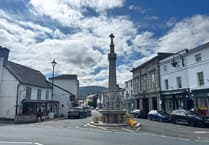IN the all too extensive library of armed conflict in the twentieth century it has been indexed as ‘the forgotten war’, but for the veterans of the 1950-53 Korean campaign, the memories may be buried deep, yet are still razor sharp when summoned to the surface.
One such veteran is well-known local man Ken Flowers who served in Korea for 14 months as part of his compulsory two year stint of national service when he was 19-years-old.
“I still never really talk to anyone about my time in Korea,” revealed Ken.
“After over 50 years the memories are still very vivid and it’s not something you dwell on. For example just a short while ago I attended a dinner-party with my wife and a few friends and the subject of national service, and the fact that I had participated in it came up.
“I remember one of the guests saying, ‘Yes, but national service was quite a soft option in those days.’ To which I replied, ‘Not for me it wasn’t, I was sent to Korea.’
“This automatically triggered everyone’s interest and the next thing I knew everybody wanted to hear about my time there. Well I started to recollect, and the next thing I knew I was on the verge of tears.”
Ken, who was living in Ross-On-Wye and working as a shop assistant when he was called up for national service, was enlisted in the King Shropshire Light Infantry in May 1951 and sent to Bordon for training.
Ken told the Chronicle, “After training, because a lot of us were still 18 we were sent to Hong Kong for a period of months until we turned 19. The rationale was that at 18 you were too young to be killed whilst doing national service, but as soon as you turned 19 they’d ship you over to Korea.”
During his time in Hong Kong, Ken, who was always a keen runner used his time to good effect by representing his regiment in various athletic meets.
In fact, Ken proved so successful in these meets he was promoted to Lace Corporal for his efforts.
After four months in Hong Kong, Ken was finally shipped to Korea and thrust straight into action on the front-line, about which he said, “In Korea the country in places is very reminiscent of Wales. When I arrived I was positioned in a trench on top of one hill while the Koreans and Chinese were dug in on an opposing one, that had roughly the same sort of distance between them as the Blorenge and Deri mountains do in Abergavenny.
“Between the two sides there was nothing but paddy fields, and upon my arrival everything was quite static for a few days with the exception of a few patrols sent on search missions.
“However on the fourth day I found myself in a trench short of men when the Chinese launched an almighty attack.”
Visibly shaken and disturbed at the recollection of his first time in a situation that thankfully most of us will never have to know, Ken described the Hellish scenario of himself and his badly-equipped comrades facing wave after wave of even worst-equipped Chinese troops running at their lines in an unrelenting attack.
Ken added, “We’d open fire and the first assault of soldiers would fall, only for a second line of troops to follow on their heels, pick up their weapons and begin the whole thing all over again.
“I think until you’ve faced the reality of war, you can never in a million years imagine the horror of it.
“You must remember I was a 19-year-old shop assistant, not a hardened solider, and was totally unprepared for my first experience of combat. Thankfully I was one of the lucky ones that survived to tell the tale.”
The hill that Ken first found himself on was hill 355, also nicknamed as ‘Little Gibraltar. It was one of the two most dominant hills west of the Imjin River, and was regarded by the military commanders as the lynchpin for holding onto all of “our hills”.
After a time spent serving on the front, Ken was shipped to an offshore island of Korea called Koje-do.
A few miles across the sea from the port of Pusan, Koje-do went untroubled by the dramas and horrors that befell the mainland until a POW camp was established there in 1951.
Ken was sent as part of a force of British troops sent to retake a compound that had been seized by its captive Chinese officers.
Ken said, “The compound was originally under American control, but the Chinese had rioted, killed some of the American guards and taken their weapons.
“British soldiers were sent in to negotiate with the Chinese, enforce discipline and restore a semblance of order for diplomatic reasons.
The Americans had lost the respect of the prisoners, because were completely over the top in their methods and tactics.
“They were understandably nervous and on-edge around the prisoners so they just blasted them with their guns if they got too close to the wire or other such infringements.”
The operation was a success, but one of Ken’s most unpleasant memories in its aftermath was his temporary role of searching the prisoner’s waste buckets for body parts.
Ken told me, “We had to do these searches, because if the Chinese caught wind of the fact that one of their number was planning to surrender, they would cut them up and dispose of various parts of their body in the waste buckets they brought out from the camp each day.”
After his time in Koje-do Ken was sent back to the front-line, but not before he handed in his stripes and asked to be demoted back to the rank of a private.
“The reasoning behind that,” explained Ken, “Was when I was put in charge of a section, the blokes I was with were proper veterans who quite honestly looked after me. There were these two guys who were ‘hard men’ in every sense of the word. I don’t know how I would have managed without them, they were older, more experienced, and they were like father figures to me. They were the ones who would make the decisions so it didn’t seem right for me, a young lad of 19 to be in charge.”
During his time on the front Ken explained how the Chinese People’s volunteers would constantly drop propaganda leaflets from airplanes exhorting the British to surrender and deflect to their side.
One such leaflet Ken still has in his possession, is a little piece of paper wishing the soldiers a merry Christmas and a happy new year, which reads, “Dear soldiers, It is Christmas and you are far from home, suffering from cold, not knowing when you will die. The big shots are home enjoying themselves, eating good food, drinking good liquor, why should you be here risking your life for their profits? The Koreans and Chinese don’t want to be your enemies. Our enemies and yours are those who sent you here and destroyed your happiness. Soldiers! Let’s join hands.”
Ken said, “We received loads of the ‘British soldiers don’t risk your life for Yankee dollars type of thing,’ but we didn’t pay it no heed, because at the same time the Chinese were blowing hell out of us.
“They had this network of tunnels dug straight through many of the hills, where they would wheel out these little guns, fire them, and then withdraw back again.”
After a total of 14 months, Ken’s time in Korea came to an end. He explained, “I was just relieved to be going home in one piece. If it hadn’t been for my time in Korea, I probably would have thought about making a life in the army, because I was always in the army cadets and what not, but after those 14 months I just wanted a return to the peace and quiet of civilian life.”
Directly after leaving the army, Ken moved to Abergavenny where he became well known as an accomplished runner, who was picked to run for Wales in the European Championships and captain them in cross-country.
Ken is also the proud owner of the unbeaten recored for the local Seven Hills challenge which he set in the sixties for a time of just over three hours.
Ken also founded the Abergavenny shop Skirrid Sports, which is now run by his son.
All these years later, however, and a random comment in a casual conversation can still trigger memories of Korea as Ken explains, “I remember once I was in the golf club and a friend said to me jokingly, ‘Ken, are you deaf?’ and I said, ‘As a matter of fact I am partially deaf in one ear.’
“He then asked how it happened, and I told him the story of how I was watching a wireless operator tune his equipment in a trench one day, and the next thing I knew the cry of ‘Incoming. Mortars’ went up.
“I dived for cover in the nick of time, but the resulting explosion still damaged my one ear and left me with a constant ringing that continues to this day.
“However, I still continue myself lucky, because the wireless operator who still had his headphones on, didn’t hear the alarm and was killed outright.”
Overall, Ken’s abiding memory of the Korean War is the friends he made, and one in particular.
“One day the company sergeant major came around asking if anyone was handy with a pair of scissors. Having worked in a menswear shop I was used to sewing and the rest of it, so I stuck my hand up, and he said, ‘Right son you’ve just landed yourself the job of company hairdresser.’
“So from then on in, on certain, quiet days I would wander around the trenches with a rifle slung over my shoulder and a pair of scissors in my hand, asking who wanted a haircut, and that’s how I came to meet Pip.
“Pip was a lieutenant and there was a well-known story of how one time a patrol from his platoon walked straight into a minefield. The patrol radioed for help and Pip took two men and a stretcher, and proceeded to walk into the minefield five times, and each time they carried another man back.
“I lost contact with Pip after the war, but I attended a reunion some time back and bumped into him, and to my surprise he remembered me. I asked him why I stuck in his mind, and he simply said, ‘Because you used to cut my hair.
“Since then Pip and I have kept in touch and remain fast friends. I also have fond memories of the two of us traveling to Shrewsbury to regularly visit another mutual old friend we knew as ‘Sergeant Mac.’
“Sergeant McCarthy was a career soldier and veteran of the second world war. He has passed away now, but he was such an inspiration to everyone who came across him in Korea.”
After serving all those years ago on a battlefield where United Nations troops suffered 142,000 casualties to restore the independence of South Korea after the communist invasion of June 1950, Ken told me in parting, “I’ll never forget Korea and my experiences there, but more importantly I’ll never forget the brave men I met and the fine friends I found in what was for me a time like no other.”
This article was originally published in a 2006 edition of the Abergavenny Chronicle.





Comments
This article has no comments yet. Be the first to leave a comment.